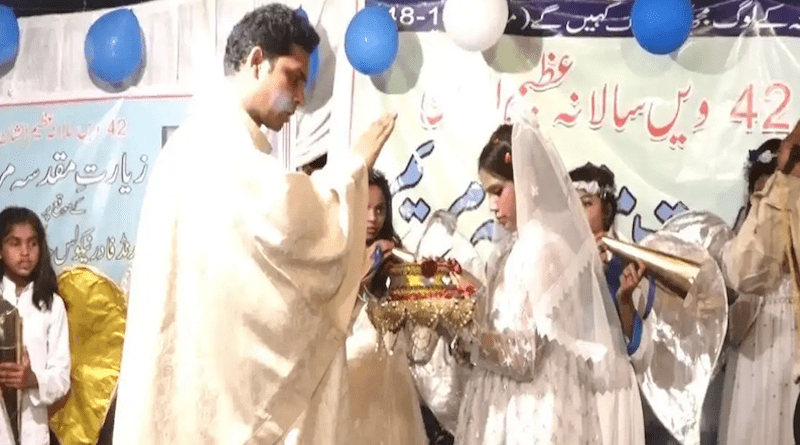Removing Satan From Pakistan Parishioners’ Pockets
By UCA News
By Kamran Chaudhry
(UCA News) — The colorful posters advertising the annual Marian pilgrimage are plastered across Tera village in Pakistan, but they come with an unusual prohibition.
“Photographing or videotaping on mobile phones is prohibited. We are all obliged to respect the holy venue. The incoming guests for pilgrimage are requested to observe the SOPs [standard operating procedures],” state notices said.
The prohibition on mobile phones aims to keep people away from distractions. It also wants to avoid photos of young women being recklessly circulated on social media in the Muslim-majority country where young Catholic women are frequently kidnapped, and forcefully converted to marry Muslims.
The coronation of a Marian statue by young girls is the main attraction of Marian fests, such as the one on Oct. 1 at Saint Mother Teresa Church Tera village in Punjab province.
Hundreds of parishes across Pakistan hold such coronations during October, the month dedicated to Mary and the rosary in the Church calendar.
Pre-teen Catholics, dressed as brides, walk gracefully towards the grotto or stage holding a gold or silver crown and place it on the Marian statue amid applause and cheers. These girls, referred to as queens, are usually chosen from a rosary group or Sunday school through a lucky draw. Two children, dressed as angels, help them in holding the crown tray.
Lahore, Faisalabad and Multan dioceses of Punjab province, home to more than 2 million Christians, have set an age limit for these queens following the arrival of the internet and mobile phones in the 1990s.
Conservative churchgoers label the phone as a smoking gun in the hands of young men in the Islamic Republic where parents keep young people on a tight leash.
As popular dating apps such as Tinder are banned in Pakistan, young people use social media for such purposes.
According to Bishop Samson Shukardin of Hyderabad, the restrictions vary in different dioceses. There is no such barrier in the southern region where there are fewer Christians.
“Photography of colorful events by ordinary people increases the risk of misusing the photos and sharing them on social media without the knowledge of these young women. The official diocesan or parish photographer helps in protecting their dignity and avoiding such problems,” he told UCA News.
Jasber Ashiq, stage secretary of the Tera pilgrimage, also urged security volunteers to stop young pilgrims from taking photos of the 12-year-old queen and her group.
“The annual practice is aimed at keeping the crowd at bay from the young girls adorned with makeup and wearing nice dresses. Some people share their photos on the internet stirring anger among the concerned families,” said Ashiq, director of Lahore archdiocese’s Catholic TV.
He said bishops discourage teen Catholics from becoming queens during such ceremonies. College students used to participate in Marian coronations more than two decades ago in major parishes of Lahore, which has always been a cultural hub. Things have changed with the advent of social media, he said.
Maleha Shehzad, a ninth grader, who participated in the Tera coronation ceremony, told UCA News that she and her friends were excited to wear the colorful dresses of the queen and the surrounding angels.
“But we didn’t take any photos as per instructions of the priest,” she said.
Shehzad is among more than 60 million active social media users in Pakistan, most of them on Facebook. The country has a large young population hooked on social media apps and gaming platforms, which has increased the demand for smartphones.
Pakistan Telecommunication Authority’s 2021 records show that the country has 188 million mobile phone subscribers, with some 49 percent consisting of mobile broadband connections.
However, the device is generally demonized by the local Church.
For example, the Pakistan Catholic Bishops’ Social Communications Commission only blesses radios and laptops at annual World Communication Day programs at the seven Catholic cathedrals in Pakistan.
In 2019, Archbishop Sebastian Shaw of Lahore famously said mobile phones are “like having Satan stashed away in your pockets when you come to church.”
The prelate called on Catholics to observe an hour of fasting from smartphones to avoid distractions during spiritual activities such as Sunday Mass.
The National Church of Pakistan (NCP), which operates 11 WhatsApp groups, also bans using smartphones during their conventions in eight Anglican dioceses around the country.
Reverend Shahzad Gill, bishop’s chaplain and NCP presbyter, said using technology “is very important for communication.”
“But Church information should only be shared with concerned media. Ordinary people may misuse this information with wrong captions or descriptions,” he said.
But not all agree with the ban on photography at Marian feasts.
Emmanuel Neno, executive secretary of the Catholic Bishops’ Commission for Catechetics, recalls that no such ban was imposed during the Sept. 9-11 popular national pilgrimage in the Catholic village of Mariamabad, also in Punjab province.
“There was no such condition when the more than half a million pilgrims gathered from all over the country. I just don’t understand this ban,” he told UCA News.
“Pilgrims, especially from outside, need communication tools to keep in touch and record spiritual experiences or hymns. Perhaps Catholic TV only wanted the exclusive rights for the coverage of the village-level pilgrimage. Mobile devices should only be switched off or turned silent during Mass,” Neno said.
Amid the increasing number of Christian broadcasters and activists using Facebook Live and YouTube, Lahore-based Catholic TV serves as the only Church-run TV channel in Pakistan.
Neno also describes the age limit for pre-teen queens and angels during Marian coronations as a cultural issue.
“It’s like dignitaries and elderly receiving bouquets from children. Aged locals especially dislike young girls in fancy dresses,” he said.

